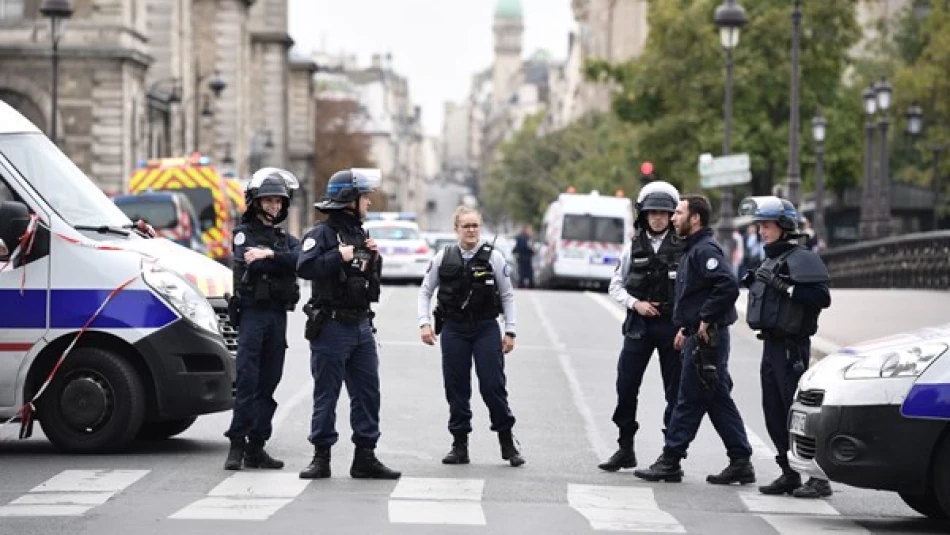
French Authorities Arrest Teenage Terrorism Suspect Plotting Attacks on Embassies and Government Buildings
France's Teen Terror Problem: 17-Year-Old Arrested for Plotting Embassy Attacks Highlights Growing Threat
French authorities have arrested a 17-year-old suspected of planning coordinated attacks on embassies and government buildings, marking the latest case in an alarming surge of minors involved in terrorist plotting. The teenager, who pledged allegiance to ISIS and compiled target lists including schools and diplomatic missions, represents a growing security challenge that has seen teen terror cases nearly double since 2023.
The Plot Uncovered
The arrest unfolded Monday at the teenager's family home in Sarthe, western France, where he sustained minor injuries while attempting to flee police. During the raid, investigators discovered a handwritten pledge of allegiance to ISIS alongside a detailed list of schools in Le Mans, the region's main city.
More concerning was the discovery of notations listing specific quantities in liters—markings investigators believe correspond to ingredients for incendiary devices or chemical explosives. The suspect's ambitions extended far beyond his local area, with plans targeting high-profile locations across France.
High-Value Targets Across France
According to sources close to the investigation, the teenager had compiled an extensive target list including the Israeli, British, and American embassies in Paris, France's Interior Ministry, various media outlets, and the European Parliament in Strasbourg. This geographic spread suggests sophisticated planning that authorities intercepted before any operational phase began.
The suspect reportedly confessed to planning multiple attacks and expressed determination to carry them out, though investigators confirmed no concrete steps toward execution had been taken prior to his arrest.
France's Accelerating Minor Terror Crisis
This case illuminates a disturbing trend that has French counterterrorism officials increasingly concerned. The numbers tell a stark story: from 15 cases involving minors in 2023, France saw 18 such cases in 2024, with 14 already recorded in the first half of 2025—including this latest arrest.
This trajectory suggests French authorities are confronting not just isolated incidents but a systematic problem of youth radicalization that shows no signs of abating. The pattern mirrors concerns across Europe, where online radicalization has proven particularly effective at reaching impressionable teenagers.
Digital Radicalization and Lone Wolves
Unlike previous generations of terrorist recruitment that relied on physical networks and direct contact, today's threats often emerge from bedrooms and family homes. The Sarthe case exemplifies this new reality—a teenager living with his parents while secretly planning mass violence, likely radicalized through online channels that remain difficult for authorities to monitor comprehensively.
The ISIS pledge discovered during the raid connects this case to a broader pattern of self-directed radicalization, where individuals adopt extremist ideologies without formal organizational membership or direct operational support.
Security Implications and Response
For French security services, these cases present unique challenges. Traditional counterterrorism approaches designed for adult networks prove less effective against minors who may radicalize rapidly and operate in isolation. The legal framework for prosecuting minors also creates additional complexities that adult terror cases do not present.
The refusal of both the French anti-terrorism prosecutor's office and the suspect's lawyer to comment suggests ongoing investigation into potential networks or additional threats. Given the suspect's confession and the evidence discovered, authorities are likely pursuing leads to determine whether this was truly a lone-wolf plot or part of broader coordination.
Prevention vs. Prosecution
The surge in minor involvement raises fundamental questions about France's approach to counterterrorism. While arrests prevent immediate threats, the underlying factors driving teenage radicalization—social isolation, online propaganda exposure, and ideological grievances—require different solutions than traditional law enforcement can provide.
As France grapples with this evolving threat landscape, the Sarthe arrest serves as both a successful interdiction and a warning sign of challenges ahead. The combination of youthful determination, digital radicalization tools, and accessible attack methods creates a security environment that demands new strategies beyond conventional counterterrorism approaches.
Most Viewed News

 Layla Al Mansoori
Layla Al Mansoori






